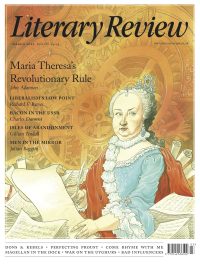Alexander Larman
A Poet’s Progress
Mother’s Boy
By Patrick Gale
Tinder Press 406pp £20
The Cornish poet Charles Causley might be an underappreciated figure today, but his fictionalised representation in Patrick Gale’s new novel should do much to introduce his work to a new audience, assuming that Mother’s Boy enjoys the success of Gale’s previous books A Place Called Winter and Notes from an Exhibition. It certainly deserves to. But this is not simply a fictionalised rendering of Causley’s life. Gale interweaves a Bildungsroman-esque account of his upbringing in 1920s Cornwall (and increasingly troubled realisation of his sexuality) with the story of how his mother, Laura, a former domestic servant, comes to believe that her son is nothing less than a genius.
Gale writes with great sympathy and authority about Causley, whom he refers to, familiarly, as ‘Charles’ throughout. At times, his writing has something of the passion of Lawrence and Hardy in its evocation of untutored promise being steadily brought out into the wider world. The depiction of Laura and

Sign Up to our newsletter
Receive free articles, highlights from the archive, news, details of prizes, and much more.@Lit_Review
Follow Literary Review on Twitter
Twitter Feed
The era of dollar dominance might be coming to an end. But if not the dollar, which currency will be the backbone of the global economic system?
@HowardJDavies weighs up the alternatives.
Howard Davies - Greenbacks Down, First Editions Up
Howard Davies: Greenbacks Down, First Editions Up - Our Dollar, Your Problem: An Insider’s View of Seven Turbulent...
literaryreview.co.uk
Johannes Gutenberg cut corners at every turn when putting together his bible. How, then, did his creation achieve such renown?
@JosephHone_ investigates.
Joseph Hone - Start the Presses!
Joseph Hone: Start the Presses! - Johannes Gutenberg: A Biography in Books by Eric Marshall White
literaryreview.co.uk
Convinced of her own brilliance, Gertrude Stein wished to be ‘as popular as Gilbert and Sullivan’ and laboured tirelessly to ensure that her celebrity would outlive her.
@sophieolive examines the real Stein.
Sophie Oliver - The Once & Future Genius
Sophie Oliver: The Once & Future Genius - Gertrude Stein: An Afterlife by Francesca Wade
literaryreview.co.uk